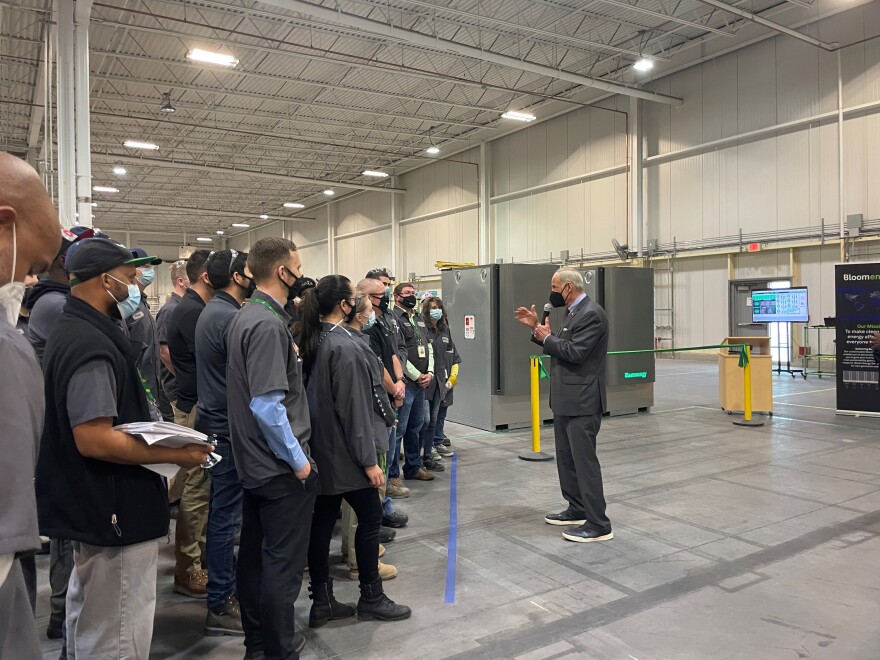Bloom Energy’s Newark facility is now manufacturing electrolyzers – technology that produces hydrogen fuel using electricity instead of natural gas.
The company touts the expansion as a boon for clean energy and Delaware’s economy, but some environmental groups question the technology’s promise.
Sen. Tom Carper (D-Delaware) helped inaugurate the new line, saying the Inflation Reduction Act’s sizeable tax credit for so-called ‘clean hydrogen’ production – $3 a kilogram – is encouraging companies like Bloom to step up production.
Bloom Energy Executive Vice President for Quality and Reliability Glen Griffiths cited the credits’ help in bringing down the cost of electrolyzers for consumers, saying Bloom expects a surge in demand — with customers ranging from data storage facilities to factories — and that Delaware will become the center for production.
“One of the key things is that the tax credit will enable hydrogen to compete on almost an even footing with other parts of electrification," he said. "That’s the same if you look back at the history of solar. At the start, it was really expensive. It was government investment that drove the volume. If you can get volume up, you get the price down."
But Food and Water Watch Policy Director Jim Walsh calls the credits premature, arguing the technology’s best uses aren’t well-studied, and that hydrogen fuel is less efficient than replacing fossil fuels with direct electrification in most cases — in part because of its use of electricity and in part because of its use of water.
“We are in a situation where we’re going to be building significant amounts of hydrogen technologies that aren’t efficient," he said, "but they’ll be built because US taxpayers will be subsidizing them.”
Hydrogen fuel technology producers like Bloom counter that gas is more easily stored and transported than electricity, but Walsh says hydrogen storage tanks and pipelines are prone to leaks.
"The hydrogen industry is pushing to transport hydrogen in the pipelines that currently transport fracked gas, which we already know are leaking," he said. "The industry recognizes this on some level, so there's talk of turning hydrogen into ammonia for storage and transportation. Ammonia is explosive and reactive like hydrogen, albeit less so, but then we run into the same basic problem: it takes electricity into hydrogen, to turn hydrogen into ammonia, and to turn ammonia back into hydrogen. In many cases, it would be more efficient to just improve our grid and directly electrify."
Walsh adds investments in hydrogen technology divert money from direct electrification efforts.
"Instead of investing that money in grid infrastructure or electrifying freight rail to reduce emissions from trucking, we might spend it on maintaining fossil fuel infrastructure like pipelines or on trying to build hydrogen-powered locomotives," he said. "That isn't an efficient way to reduce emissions.
Walsh does, however, note that hydrogen power might be useful in some limited applications, including steel production, but he says those uses need to be studied more extensively before resources are devoted to them.
For his part, Carper cast investments in the technology as part of a strategy to invest in a broad range of alternative fuel technologies.
Bloom Energy could not provide information about the initial customers for its electrolyzers, but Griffiths notes some of the product may head to international markets. The plant currently employs roughly 700 people, but Bloom Energy expects that number to grow as demand for the electrolyzers increases.
The company has previously faced scrutiny in Delaware for operating a set of newly installed fuel cells before it was permitted to by the state's Division of Natural Resources and Environmental Control, as well as for returning $1.5 million in incentives it received from the state after failing to deliver on a promise to provide hundreds of new jobs in 2017.
For over a decade, Bloom Energy has also placed a $5 surcharge on Delmarva Energy customers' bills, ostensibly to help Delmarva Energy meet its renewable energy generation requirements — a charge some state lawmakers have questioned, given that the fuel cells Bloom Energy uses to generate electricity are powered by natural gas or biogas, both of which produce carbon emissions.



